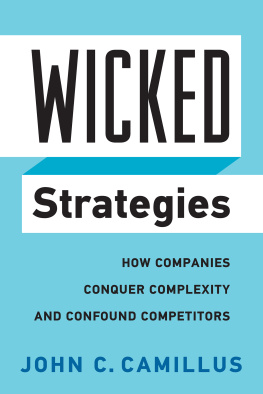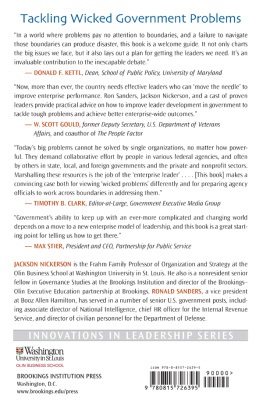JOHN C. CAMILLUS
John C. Camillus 2016
Includes bibliographical references and index.
ISBN 978-1-4426-5055-8 (bound)
1. Strategic planning. 2. Business planning. 3. Organizational change. I. Title.
University of Toronto Press acknowledges the financial assistance to its publishing program of the Canada Council for the Arts and the Ontario Arts Council, an agency of the Government of Ontario.
Preface
In business, some problems are easy, some problems are hard, and some problems are so complex, so intractable, and so threatening to organizations or entire industries that they are best described as wicked. These problems resist easy interpretation or understanding; they pose questions which seem, to observers, to be unsolvable; and, they render traditional analytical tools of strategy virtually impotent, requiring new approaches to analysis. To the fascination and horror of managers, wicked scenarios, and the consequent wicked strategy problems that follow in their wake, are becoming increasingly commonplace.
The hallmark of a wicked situation is a rapidly transforming business environment in which established models of profitability and success are undergoing unpredictable and sea changes. To managers facing a wicked problem, it can feel as if the ground is shifting under their feet so quickly that no one knows what will happen next; all that is clear is that traditional solutions no longer work in the new environment. The wicked scenario is made more difficult because the perceived problem itself keeps changing as different solutions are considered.
Wicked problems were first recognized in the public policy arena as an entirely different class of problems, requiring entirely new problem solving approaches. In the United States, immigration issues, terrorism, religious fundamentalism, racism, and gun violence are such problems. In India, corruption, religious fundamentalism, communal violence, violence against women, and rural poverty are equally daunting issues that have so far resisted solution. They are caused by a multiplicity of interrelated factors, are viewed differently by different parties, have no apparent solution, and mutate as different solutions are considered. In our technology age, wicked problems are a fact of life when designing and building large-scale information systems. The debacle that was the rollout of the healthcare.gov website supporting the Affordable Care Act in the United States is not an atypical experience with large-scale information systems.
Over the years, I have observed the increasing frequency of the occurrence of wicked problems faced by managers in organizations through both my consulting and my research. In my 2008 Harvard Business Review article titled Strategy as a Wicked Problem, I wrote about how managers can identify and more effectively respond to wicked problems in the arena of competitive strategy. The article excited a huge response from academics, consultants, and managers. Bayer and PPG were among the companies that made the article required reading for senior managers.
Encouraged by the response to the article, I have written this book to provide an updated, comprehensive, and detailed how-to manual for identifying, responding to, and even profiting from wicked problems. This book details the significant forces that underlie the increasing frequency with which wicked problems are encountered. And, as in certain martial arts, it shows you how to skillfully and resolutely turn these threatening forces to your advantage in handling wicked problems.
What the book offers are what millennials would call wicked cool approaches to manage wicked problems in the strategic management of organizations what we will refer to more succinctly as Wicked Strategies. The Wicked Strategies presented in the book are drawn from the hundreds of organizations for which I have consulted. I have also researched Wicked Strategies in depth as part of five global benchmarking studies in which I have been involved. Wicked Strategies are one of the major foci of the case studies I have developed for a global, ongoing, permanently funded project called the Business of Humanity. Based on the experiences of the organizations that were studied, I am confident that Wicked Strategies will work for you. But, just to increase your confidence, I have included a soupon of theory and have also used a couple of widely known strategy frameworks to support the Wicked Strategies that are described.
The Wicked Strategies approach I present is occasionally counterintuitive, is substantially unconventional, and is, I hope, inspirational. Wicked Strategies prepare firms and managers to prevail over paradoxes, and to create and profitably exploit disruptions. Wicked Strategies are designed to enable firms to achieve two apparently conflicting, yet utterly necessary goals. Wicked Strategies ensure economic sustainability by positioning a firm to (1) aggressively seek to enhance the competitive advantage of their existing businesses, while at the same time (2) resolutely transform to make the existing businesses obsolete before the context or competition does it to them.
The secret to achieving these apparently conflicting goals is an evocative and enduring strategy construct, a dynamic and ambidextrous organizational structure, and an innovative and visionary set of analytical processes that form a management system that creates and deploys Wicked Strategies.
Throughout the book I have striven to keep both explanations and recommendations simple. When three forces can capture and illustrate the impact of a host of factors, and when responding to these three forces leads to managerial frameworks and responses that effectively address and respond to the host of factors, I have opted to share my identification of the three forces rather than offer a comprehensive and impressive but confusing list of possible factors. When three constructs can create a framework that can respond effectively to wicked problems in general, I opt to limit my recommendations to these three rather than offer a scholarly inventory of constructs from which you have to choose. In seeking focus and simplicity, I relied on my experience and my interpretation of academic research. You may see this as a limitation of the book or as a strength.
My education and training at the three amazing and wonderful institutions that I had the extreme good fortune to attend Harvard Business School for my doctorate, the Indian Institute of Management, Ahmedabad, for my masters in management, and the Indian Institute of Technology, Madras, for my bachelors in mechanical engineering taught me that, as a professional, the most important question to ask is, So, how does this understanding affect what we should be doing differently at 9:00 a.m. on Monday morning? It is the question I have asked the thousands of graduate students and practicing managers whom I have taught, the scores of clients for whom I have consulted on four continents, and the dozens of academic colleagues and experts with whom I have interacted. It is this question, in the context of wicked problems, which this book seeks to answer.














 Printed on acid-free, 100% post-consumer recycled paper with vegetable-based inks.
Printed on acid-free, 100% post-consumer recycled paper with vegetable-based inks.